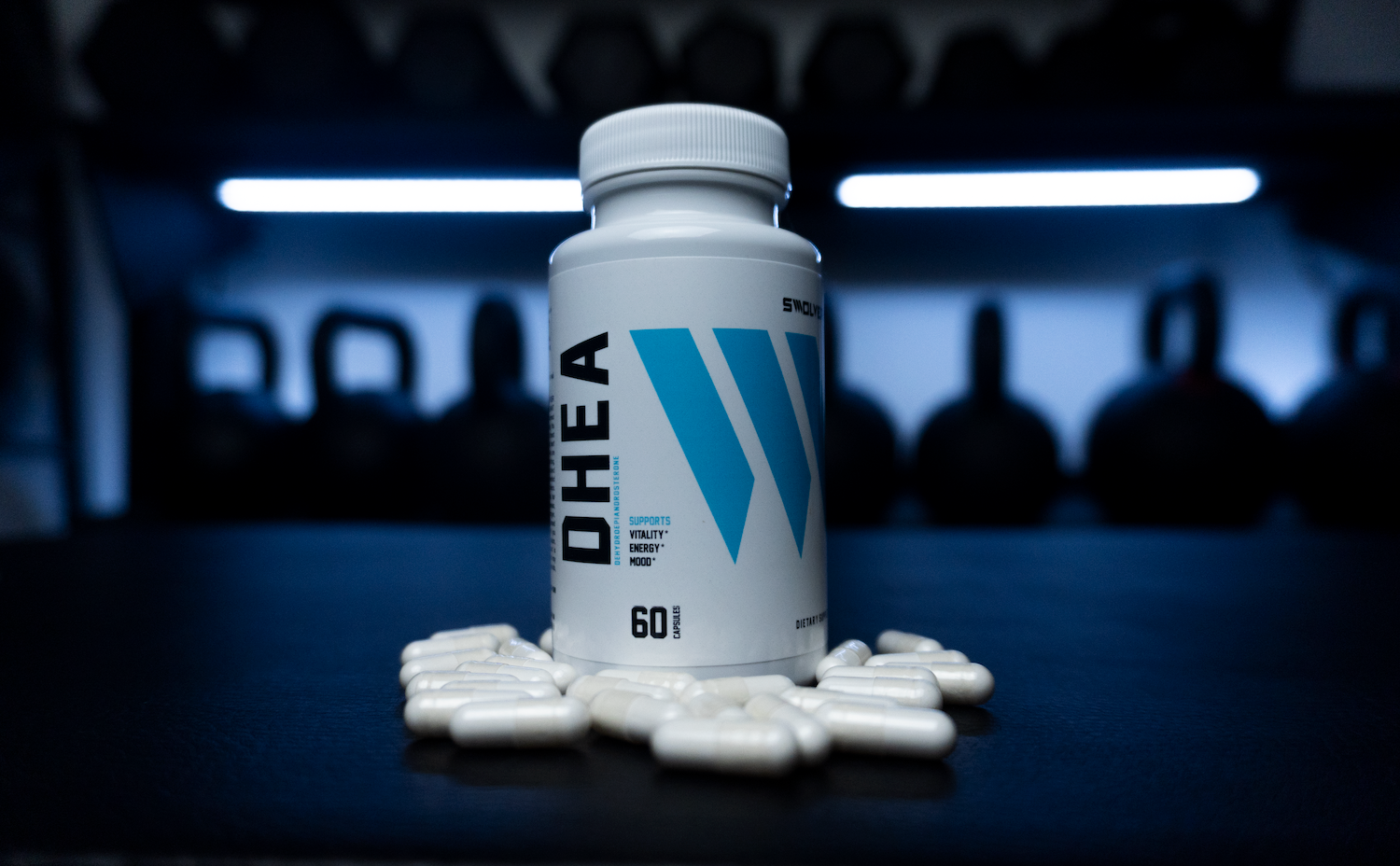Are you ready to tap into your body's hidden potential? For many, the journey to optimal health often feels like an uphill battle, plagued by fatigue, stress, and hormonal imbalances. Enter DHEA, a powerhouse hormone that plays a crucial role in regulating many of your body’s systems. Often hailed as the ultimate hormone balancing supplement, DHEA (dehydroepiandrosterone) can transform the way you feel, enhancing energy levels, mood, and overall vitality.
This article will guide you through the remarkable benefits of DHEA, exploring its pivotal role in maintaining hormonal equilibrium. Whether you’re seeking to regain youthful energy or improve your well-being, understanding how to incorporate DHEA into your wellness routine could be the key to unlocking your body’s true potential.
Dive in to discover why DHEA is not just a supplement, but a game-changer in your health journey!
Unlock Your Body's Potential: How DHEA Is the Ultimate Hormone Balancing Supplement
Are you ready to tap into your body's hidden potential? For many, the journey to optimal health often feels like an uphill battle, plagued by fatigue, stress, and hormonal imbalances. Enter DHEA, a powerhouse hormone that plays a crucial role in regulating many of your body’s systems.
Often hailed as the ultimate hormone balancing supplement, DHEA (dehydroepiandrosterone) can transform the way you feel—enhancing energy levels, mood, and overall vitality. This article will guide you through the remarkable benefits of DHEA, exploring its pivotal role in maintaining hormonal equilibrium.
Whether you’re seeking to regain youthful energy, support your immune function, or improve overall well-being, understanding how to incorporate DHEA into your wellness routine could be the key to unlocking your body’s true potential.
What Is DHEA and Why Does It Matter?
Dehydroepiandrosterone, commonly known as DHEA, is a naturally occurring hormone produced by your adrenal glands, located just above the kidneys. DHEA is classified as a precursor hormone, which means it converts into more potent and active hormones like testosterone and estrogen. This conversion process makes it essential for hormonal balance in both men and women.
Your DHEA levels peak in your mid-20s and begin to decline with age, which is associated with a range of symptoms—low energy, reduced libido, weakened immunity, and even cognitive decline (Cleveland Clinic, 2023).
The Biological Role of DHEA in Hormonal Balance
As a precursor, DHEA doesn’t work directly in isolation but rather fuels the production of key hormones that control multiple systems in your body. These include:
-
Metabolism and energy production
-
Mood and cognitive function
-
Sexual health and reproductive function
-
Immune response and inflammation regulation
Research has shown that maintaining adequate DHEA levels supports a more efficient hormonal environment, which may help reduce symptoms of adrenal fatigue, depression, and age-related hormone decline (Morales et al., The Journal of Clinical Endocrinology & Metabolism, 1994).
DHEA and Cognitive Health: Neurosteroids in Action
One of the lesser-known but highly impactful benefits of DHEA is its role in the production of neurosteroids. These are chemical messengers in the brain that influence:
-
Cognitive function
-
Memory formation
-
Mood stability
-
Neuroprotection
DHEA-derived neurosteroids help regulate brain excitability and protect against neurodegenerative diseases such as Alzheimer’s and Parkinson’s (Maninger et al., Frontiers in Neuroendocrinology, 2009).
Because of this, some researchers are exploring DHEA’s potential as a nootropic agent—a compound that supports brain health and cognitive performance.
Supplementing with DHEA may provide a powerful edge in your wellness journey, particularly if you're dealing with:
-
Chronic stress or adrenal burnout
-
Mood disorders like anxiety or depression
-
Age-related hormonal decline
-
Low libido or sexual dysfunction
-
Cognitive fog or memory issues
DHEA isn’t just another supplement on the shelf—it’s a cornerstone of hormonal health, energy production, and mental well-being. By restoring healthy levels of this critical hormone, you support your body’s natural ability to rebalance, rejuvenate, and thrive.
Unlock Your Body’s Potential: How DHEA Is the Ultimate Hormone Balancing Supplement
The Importance of Hormonal Balance
Hormonal balance is essential for maintaining optimal health and well-being. Hormones act as chemical messengers, traveling through the bloodstream to organs and tissues to regulate a wide range of physiological processes, including:
-
Metabolism
-
Immune function
-
Reproductive health
-
Mood regulation
-
Energy production
When hormone levels become imbalanced, the body can experience various symptoms—ranging from chronic fatigue and depression to metabolic dysfunction and reproductive challenges (Mayo Clinic, 2022).
One of the most critical hormones in this equation is DHEA (dehydroepiandrosterone). DHEA serves as a precursor to both testosterone and estrogen, providing the foundational compounds needed for hormonal synthesis. When DHEA levels are within a healthy range, the body is better equipped to produce and balance other hormones—contributing to improved mood, energy, and overall vitality.
It’s important to note that hormonal imbalance isn’t limited to aging individuals. Stress, inadequate sleep, poor nutrition, and a sedentary lifestyle can all lead to hormonal disruption—even in younger adults. By supporting DHEA levels through supplementation or lifestyle changes, individuals can work toward a more balanced hormonal environment and reduce the risk of chronic health issues (Harvard Health Publishing, 2023).
Health Benefits of DHEA Supplementation
DHEA supplementation delivers a wide range of health benefits that go far beyond hormone replacement therapy. Some of the most significant advantages include:
1. Increased Energy and Reduced Fatigue
DHEA has been shown to boost energy levels and improve overall vitality, especially in individuals experiencing hormonal decline or adrenal fatigue. Many report feeling more alert, active, and motivated after consistent supplementation (Weiss et al., Journal of Clinical Psychopharmacology, 1999).
2. Enhanced Mood and Mental Health
As a precursor to neurosteroids, DHEA plays a significant role in cognitive health and emotional stability. Research has found that DHEA can help reduce symptoms of depression and anxiety by modulating brain chemistry and supporting neurotransmitter activity (Schmidt et al., Archives of General Psychiatry, 2005).
3. Strengthened Immune System
DHEA positively affects immune function by increasing the activity of natural killer cells—crucial for defense against infections and abnormal cell growth. These immune-enhancing effects are especially beneficial in aging populations or those with compromised immunity (Buford & Willoughby, Nutrition, 2005).
4. Bone Density, Sexual Health, and Metabolic Support
Additional evidence supports DHEA’s role in promoting:
-
Stronger bones and reduced risk of osteoporosis
-
Improved sexual function and libido
-
Better metabolic health, including support for blood sugar regulation and fat metabolism
These multifaceted benefits make DHEA a powerful addition to any well-rounded health optimization strategy.
How DHEA Affects Aging and Vitality
Aging naturally results in a progressive decline in DHEA levels, which contributes to many of the symptoms commonly associated with getting older—such as reduced muscle mass, lower energy, and decreased libido. Because DHEA is a building block for estrogen and testosterone, this decline often results in:
-
Loss of muscle and strength
-
Reduced bone density
-
Fatigue and lower stamina
-
Mood disturbances
-
Cognitive decline
Studies have shown that DHEA supplementation may reverse or mitigate some of these aging-related effects by restoring hormonal balance and supporting the production of testosterone and estrogen (Baulieu et al., Proceedings of the National Academy of Sciences, 2000).
DHEA is also critical for the production of neurosteroids, which are essential for protecting brain health, memory, and cognitive performance. This is especially important in older adults, as these neurosteroids may help reduce the risk of neurodegenerative conditions such as Alzheimer’s disease (Maninger et al., Frontiers in Neuroendocrinology, 2009).
By preserving both physical and mental vitality, DHEA offers a comprehensive approach to aging well and maintaining performance throughout life.
Unlock Your Body’s Potential: How DHEA Is the Ultimate Hormone Balancing Supplement
Signs of DHEA Deficiency
Recognizing the signs of DHEA deficiency is a crucial step toward addressing hormonal imbalances and improving long-term health. Low DHEA levels can present with a range of symptoms that are often mistaken for unrelated conditions. Common signs include:
-
Chronic fatigue or low energy
-
Decreased libido
-
Mood swings or irritability
-
Difficulty concentrating or brain fog
These symptoms can significantly impact quality of life, making it essential to consider hormonal imbalances as a potential underlying cause.
In addition to these general symptoms, low DHEA levels can also contribute to more gender-specific health issues:
-
Women may experience:
-
Irregular menstrual cycles
-
Vaginal dryness
-
Reduced fertility
-
-
Men may experience:
-
Loss of muscle mass
-
Increased body fat
-
Erectile dysfunction
-
For both men and women, weakened immune function is also a concern, as DHEA plays a role in supporting the immune system’s ability to fight off infections and illness (Kleindienst et al., Journal of Clinical Endocrinology & Metabolism, 2001).
If you suspect you may have a DHEA deficiency, consult a healthcare professional for lab testing and clinical evaluation. Addressing a deficiency can help restore hormonal balance, alleviate symptoms, and promote overall well-being.
DHEA Dosage: How Much Should You Take?
Finding the right DHEA dosage is essential for maximizing benefits while minimizing risks. The appropriate dose depends on several individual factors including:
-
Age
-
Biological sex
-
Health status
-
Hormone levels
For most adults, a starting dose of 25 to 50 milligrams per day is common (NIH Office of Dietary Supplements, 2022). However, some individuals may require a lower or higher dose based on testing and clinical goals.
Key Guidelines:
-
Start low and increase gradually if needed
-
Use regular blood tests to monitor hormone levels
-
Women typically require lower doses than men
-
Adjust dosage with your provider if any side effects occur
Because hormone levels vary widely from person to person, it’s critical to work with a healthcare provider experienced in hormone therapy. They can help ensure your dosing strategy is safe, effective, and aligned with your health goals.
Potential Side Effects and Risks of DHEA
While DHEA supplementation provides numerous benefits, it’s important to be aware of the potential side effects and risks, especially when taken at higher doses or without medical supervision.
Common Side Effects (Dose-Dependent):
-
Acne or oily skin
-
Hair thinning or hair loss
-
Increased facial hair in women
-
Mood changes or irritability
These side effects are usually linked to elevated testosterone levels resulting from DHEA conversion and can often be reduced by lowering the dosage.
More Serious Risks:
-
Hormone-sensitive cancers – DHEA may elevate estrogen or testosterone levels, potentially increasing the risk for hormone-sensitive cancers such as breast, prostate, and endometrial cancers. Clinical research suggests caution for individuals with a personal or family history of these conditions (Labrie et al., Endocrine Reviews, 2005).
-
Liver health concerns – Although rare, excessive or long-term use of DHEA may impact liver enzyme levels, especially if used in conjunction with other supplements or medications that tax liver function.
-
Endocrine disruption – Overuse or inappropriate dosing of DHEA can lead to hormonal imbalances such as elevated estrogen or testosterone, which may manifest in unwanted side effects like gynecomastia in men or menstrual irregularities in women.
Special Considerations and Contraindications
Certain individuals should use caution or avoid DHEA supplementation entirely, especially without clinical supervision:
-
Individuals with a history of hormone-related cancers
-
People with polycystic ovary syndrome (PCOS)
-
Those with liver disease or impaired liver function
-
Individuals taking hormone therapy, corticosteroids, or certain psychiatric medications
DHEA can interact with drugs such as antidepressants, antipsychotics, and some immunosuppressants. Always consult with your healthcare provider to evaluate potential interactions and ensure that DHEA fits within your comprehensive health plan (National Institutes of Health, 2022).
Natural Ways to Boost DHEA Levels
While DHEA supplementation is a widely used method to increase hormone levels, there are several natural lifestyle strategies that can support your body’s ability to produce DHEA on its own. These holistic practices promote adrenal health and help maintain hormonal balance without synthetic intervention.
1. Stress Management
Chronic stress is a major contributor to adrenal fatigue and DHEA depletion. The adrenal glands, which produce both cortisol and DHEA, can become dysregulated under prolonged stress. High cortisol output often comes at the expense of DHEA production.
To mitigate this, incorporating stress-reducing practices can significantly support natural hormone regulation:
-
Meditation or mindfulness
-
Deep breathing techniques
-
Yoga or tai chi
-
Cognitive behavioral strategies
Studies show that mind-body interventions can reduce cortisol levels and enhance adrenal function, indirectly supporting DHEA production (Pizzorno & Murray, Textbook of Natural Medicine, 2020).
2. Exercise and Physical Activity
Regular exercise, particularly resistance training and high-intensity interval training (HIIT), has been associated with elevated DHEA levels. Engaging in consistent physical activity supports endocrine function and stimulates hormonal adaptation to physical stress (Häkkinen et al., European Journal of Applied Physiology, 2000).
Aim for a combination of:
-
Weightlifting (2–4 times per week)
-
Cardiovascular activity
-
Active recovery days
3. Nutrient-Rich Diet
What you eat significantly influences your hormone health. A balanced diet rich in healthy fats, lean proteins, and antioxidants supports adrenal glands and facilitates DHEA synthesis.
Key dietary elements include:
-
Omega-3 fatty acids – Found in fatty fish, walnuts, and flaxseeds
-
B vitamins – Essential for adrenal support (leafy greens, legumes, whole grains)
-
Vitamin C and zinc – Vital for stress response and immune support
Research has found that diets high in anti-inflammatory foods correlate with better adrenal and hormonal resilience (Gibson et al., Journal of Nutritional Biochemistry, 2014).
By adopting these foundational habits, you can naturally support your body's own production of DHEA—enhancing health, vitality, and hormonal equilibrium.
DHEA vs. Other Hormone Supplements: A Comparative Analysis
When choosing a hormone supplement, it’s important to understand how DHEA compares to other hormone therapies, such as testosterone, estrogen, and progesterone. Each serves a specific function and may be appropriate based on individual hormone deficiencies.
1. DHEA vs. Testosterone and Estrogen
Testosterone and estrogen supplements are often prescribed to treat specific deficiencies—such as in cases of andropause, menopause, or hypogonadism. While these therapies are targeted, they bypass the body’s natural regulatory processes, directly increasing specific hormone levels.
DHEA, on the other hand, acts as a precursor hormone, meaning the body can convert it into testosterone or estrogen as needed, based on internal demands. This makes DHEA:
-
A more adaptive option for hormonal support
-
Beneficial for both men and women
-
Capable of enhancing multiple hormonal pathways
According to clinical studies, supplementing with DHEA can help restore hormone levels without pushing one particular hormone too far out of balance (Baulieu et al., PNAS, 2000).
2. DHEA vs. Progesterone
Progesterone therapy is primarily used for women to support menstrual health, fertility, or menopausal symptoms. It’s often prescribed in cases of estrogen dominance or to regulate the menstrual cycle.
While progesterone targets one hormone specifically, DHEA supports:
-
Testosterone
-
Estrogen
-
Neurosteroids
This gives DHEA a broader range of physiological effects, making it especially valuable for overall vitality, energy, immune support, and cognitive health.
3. Which One Is Right for You?
Choosing between DHEA and other hormone therapies depends on:
-
Your specific hormone profile
-
Symptoms and overall health goals
-
Whether you need targeted vs. systemic support
A healthcare provider can help assess hormone levels and guide you toward a tailored approach—whether that includes DHEA, bioidentical hormone therapy, or a combination.
Where to Buy High-Quality DHEA: Swolverine’s Science-Backed Solution
If you're ready to optimize your hormone health, energy, and overall vitality, it’s important to choose a DHEA supplement that’s clinically effective and cleanly formulated. At Swolverine, we’ve designed our DHEA to deliver real results with a potent 100mg per serving—perfect for individuals looking for advanced hormone support.
Why Choose Swolverine DHEA?
-
100mg DHEA per capsule – A high-strength, clinically dosed formula for serious results
-
Third-party tested – Guaranteed purity, potency, and safety
-
No proprietary blends – You get exactly what’s on the label
-
Vegan, gluten-free, and non-GMO – Clean and effective for every lifestyle
Swolverine DHEA is ideal for those who want to:
-
Support healthy testosterone and estrogen levels
-
Combat fatigue, brain fog, and low libido
-
Enhance immune function, bone density, and mood
-
Optimize physical performance and body composition
👉 Shop Swolverine 100mg DHEA and experience the difference that clinically dosed hormone support can make.
Explore More Hormone Optimization Tools
Looking to build a complete plan for hormone health and performance? Explore these expert resources from our team at Swolverine and The Swole Kitchen:
For personalized guidance, visit The Swole Kitchen and learn how our certified coaches can help you implement a customized hormone and nutrition strategy based on your goals.
Conclusion: Is DHEA Right for You?
The journey to optimal health and well-being is unique for each individual, and understanding the role of DHEA in maintaining hormonal balance is an important step in this journey. DHEA supplementation offers a range of benefits, from enhancing energy levels and mood to supporting immune function and cognitive health. However, it is essential to approach supplementation with caution, considering potential side effects and individual health needs.
Consulting with a healthcare provider who is knowledgeable about hormone health is crucial for determining whether DHEA is the right choice for you. They can help assess your hormonal balance, recommend appropriate dosages, and monitor your progress to ensure that you achieve the desired benefits safely and effectively.
By understanding the pivotal role of DHEA in your body and exploring both supplementation and natural ways to support its production, you can take proactive steps towards unlocking your body's true potential. Whether you seek to regain youthful energy, improve mental clarity, or enhance overall well-being, DHEA may be the game-changer you need on your path to optimal health.













